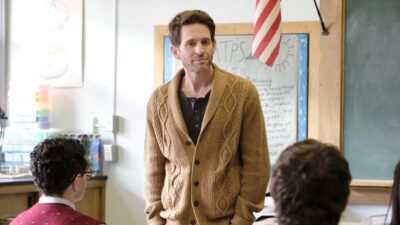This article previously appeared on Crossfader.
In this Crossfader series, our intricate and complex rating system will tell you definitively whether new television pilots are worth your valuable time. We call it: HIT OR SH**.
With the centennial anniversary of the Roaring Twenties on the horizon, we can expect droves of nostalgic period pieces featuring extravagant boom-economy wealth, old-timey promiscuity that feels oddly quaint now, and of course, Hollywood’s favorite subject: itself. THE LAST TYCOON—originally an unfinished novella by F. Scott Fitzgerald—brings us back to the Golden Age once again, determined to expose the gritty realities of America’s most glamorous city and industry. The only problem is that they don’t seem to have anything new to say about it.

g l a m o u r o u s
THE LAST TYCOON demonstrates the biggest problem with familiar subject matter: unoriginality. I can’t speak for everyone, but at this point I’m well aware that the glitz and glamour of Hollywood masks a cutthroat business where innocent young artists must regularly compromise their personal ideals for the sake of corporate profit. This concept is frequently portrayed, within this show and countless others, as the protagonist screaming, “We need to do what’s morally and artistically right!” and his sympathetic but jaded boss screaming back, “We can’t do that because we need money to survive, so we have to sell out.” The protagonist heroically declares that they would rather die than sell out, and so begins the battle between a passionate young artist and a soulless corporate entity.
Unfortunately, that paragraph is also a summary of THE LAST TYCOON’s pilot. Our hero, Monroe Stahr (Matt Bomer), wants to make a film about the life and tragic death of his late wife, Minna. His boss, studio head Pat Brady (Kelsey Grammer), wants to make substantial edits to the film in order to meet the demands of the newly elected Adolf Hitler. The Great Depression hit Hollywood so hard that they were dependent on foreign sales, and Hitler wouldn’t allow movies about Jewish people into Germany. Stahr doesn’t take kindly to placating the Fuhrer, and so begins the battle between a passionate young artist and a soulless corporate entity. The series carries itself with the panache of a story with deep moral complexity, but people tend to root for the side that isn’t Hitler.

Well, most people…
Like most shows starring a Prestige Drama Antihero, THE LAST TYCOON works best when the focus is on the main character. Despite doing very few interesting things, the dialogue and demeanor of Monroe felt oddly refreshing. Considering the formulaic plot and that the show’s visual style owes so much to MAD MEN, I expected Stahr to be a Don Draper knockoff: the most talented guy in the room, friends with everyone, and a master of seduction, but heavily burdened by demons from his past. All of those things are true about Monroe, but he doesn’t always act like it.
The pilot of THE LAST TYCOON ends with the revelation that Monroe has been banging his boss’s wife Rose (Rosemarie DeWitt), and of course they have him be the Stoic Business Man that’s ending the affair because it’s now Too Risky, and she becomes the Hysterical Woman who can’t handle facing the emotional void of her marriage without the Hero’s Penis. But what salvages this gross old scene is Monroe’s reaction; when Rose asks if he’s angry with her for being upset, he replies with a curt, “yes,” and throws the blinds closed. So that’s points for having a man admit that he’s feeling an emotion, but it also adds so many more possibilities for the rest of the series. Is he a psychopath, actually angry at someone for getting attached after sex? Or is he referring to the bigger picture, and is angry that circumstances are forcing him to end a relationship he’d genuinely like to pursue? I’m not exactly losing sleep over this question, but it was a patch of intrigue and mystery in a largely dull pilot.


When you don’t trust your audience to understand middle school-level satire
Another bright spot in THE LAST TYCOON’s cast is Celia (Lily Collins), Pat’s daughter. She adds a tiny splash of diversity to the period-reflecting cast, and appears to be smarter than everyone else at the studio. She’s still attracted to Monroe, as is every female character in the show, but Celia is given an identity beyond “person who wants to boink Monroe” through her One Big Idea. After enduring Monroe’s callous brush-offs, she finally pitches him her script about a woman who suspects that spies from the mythical fascist regime of Birnel (anagrams, anyone?) are operating out of her apartment. This protects the film from being called out by the Nazis, because claiming that the film is about them would be admitting to their crimes. Monroe loves the idea, which hopefully means that Celia will get more space to be a badass screenwriter and spend less time pining for Monroe.
The high schooler in me—the one that swore THE GREAT GATSBY was the best book until college made me read numerous better books—wants to recommend this as a competent period piece filled with old-timey film references and symbolic set pieces that are sure to stroke the egos of those nerdy enough to notice them. But considering the molasses-paced plot, a hero that’s only likable half of the time, and a depressing misuse of Kelsey Grammer’s immense talent, I have to throw THE LAST TYCOON in the pile with the Baz Luhrmann remake of the book that made me feel so smart five years ago.
Verdict: Do Not Recommend
















Comments